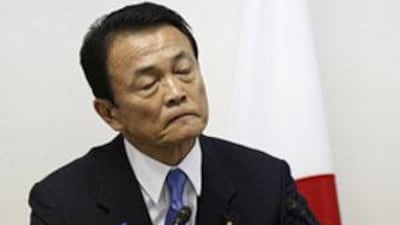The Japanese prime minister Taro Aso has dissolved the powerful lower house of parliament, setting the stage for national elections next month that could transform the country's political power structure. In Japan, the prime minister can decide when to disband parliament and call a general election. Mr Aso had postponed doing so in the hope that his low approval ratings would recover, but after his party was routed in local elections last week he announced the elections for parliament's lower house would be held Aug 30.
The country's political parties quickly shifted into election mode, holding rallies of their legislators. Japan's opposition leader vowed the elections would be "historic". The ruling Liberal Democratic Party has maintained a majority in the lower house for most of the past 50 years, allowing it to dominate the legislative process and select the prime minister and cabinet members from party ranks. Recent opinion polls show the next election could be different, with many voters saying they will support the opposition.
This has happened repeatedly in local elections, where the Liberal Democrats have suffered a string of defeats. "The feelings and complaints of the people have been demonstrated in the recent elections. We must sincerely reflect on this and are determined to make a fresh start," Mr Aso told party legislators. At an upbeat meeting of the biggest opposition party, the Democratic Party of Japan, party leader Yukio Hatoyama said the election would lead to a major change in Japanese politics for the first time in decades.
"This is not just a matter of drawing the curtain on the Liberal Democrats. It is not as small as that," he said. "We must go into this election with a feeling of our historic mission." Several recent polls have indicated broad support for the Democrats. Fifty-six per cent of voters said they wanted the Democrats to take power, with just 23 per cent supporting the ruling party, according to a poll published on Monday in the Mainichi newspaper.
In a poll by the Asahi newspaper, 49 per cent backed a new government led by the Democrats and 22 per cent wanted Mr Aso's party to stay in power. The Democrats favour a more independent stance from the US, smaller government and more international peacekeeping missions for Japan's military. *AP

